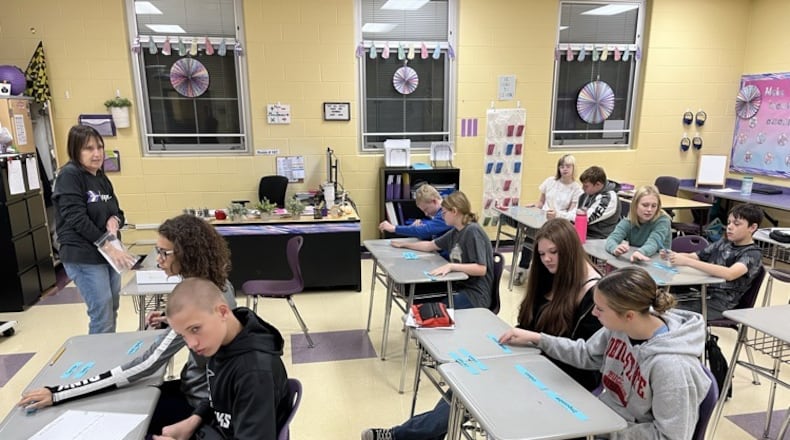Because renewal levies take taxes that voters have previously approved and extend them for additional years without increasing the rate, a strong majority of them are usually approved. But all four of these jurisdictions saw their renewal levies rejected this cycle.
Mechanicsburg and Triad schools
Mechanicsburg’s 15-year, 1% income tax renewal was rejected, with 50.7% of votes against it and 49.3% for it. Out of 2,452 votes cast, the margin was 34 votes (1243 to 1209).
Triad’s five-year, 0.5% income tax renewal levy was even closer, with 50.25% against it and 49.75% for it. The margin was 13 votes (1287 to 1274).
Neither school district will lose funding immediately. According to charts on the Ohio Department of Taxation website, Triad’s existing income tax levy won’t expire until the end of 2025, and Mechanicsburg’s won’t expire until the end of 2026.
Mechanicsburg Superintendent Danielle Prohaska said their levy generates $1.4 million annually and is used for operating expenses, primarily to cover the cost of staff wages and benefits.
“The income tax renewal is collected for two more years, so taxpayers still have time to pass this levy,” she said. “We have been breaking down our precinct data and will use that data to plan how we share information with our community members in the different parts of the district. The district also has a contingency of voters in Madison County, and we will be ensuring all voters who filter into the district are connected with the information necessary about the next levy renewal.”
Triad Superintendent Vickie Maruniak agreed with Prohaska, saying “there is still plenty of time for tax payers to pass this levy renewal.” The district will also analyze their results to determine the “best course of action” on sharing information about the renewal to the community.
“Our goal is to ensure that all voters are informed on the great things going on at Triad and the importance of the levy renewal,” Maruniak said.
Mechanicsburg also had a separate 10-year, 1.4-mill renewal property tax levy on the ballot, and that one passed, with 53.8% in favor, and 46.2% against it. Prohaska said this levy had failed two times before, with previous failures being close.
Maruniak said Triad had not had a renewal levy rejected since the fall of 1993, when the permanent improvement levy originally passed in 1984 failed.
Although these levies will collect for a couple more years, both districts are reevaluating staffing, vendor and service contracts up for renewal, and grant funds available. The superintendents said they will do this again in the spring.
At upcoming meetings, Mechanicsburg and Triad’s school boards will consider the necessary resolutions to put the levies back on the ballot in May.
St. Paris village
St. Paris’ five-year, 4-mill renewal levy for street improvements failed with 55.2% voting against it and 44.8% for it.
The property tax levy generates $124,000 annually. Like the schools’ situation, the village has a little time to consider next steps, as the levy doesn’t expire until the end of 2025.
“I can’t speculate on why the levy was rejected,” said village administrator Spencer Mitchell. “My focus and the focus of the staff here at the village is to evaluate the conditions of the aging infrastructure and work on coordinating a funding plan to maintain or replace. We do our best to work within the confines of our budget and provide community improvements to the residents.”
Mitchell said council is working to decide whether or not to put the levy back on the ballot. This is not the first levy to fail in the village, but a recent street levy renewal and a stormwater levy in the 2010s were the only two that were rejected in the last seven years.
Over the last five years, St. Paris has applied for and received over $2.3 million in grants; started the first phase of the West Plum reconstruction project, which will include a new water main, service lines, sidewalks, valves and hydrants, as well as reconstructing all of West Plum Street; and hope to start work next spring on replacing 5,500 linear feet of water main on U.S. 36.
Johnson Township
Johnson Twp. residents rejected a five-year, 1-mill renewal levy for road and bridge improvements, with 52.2% voting against it and 47.8% for it.
This levy, which will stop collecting at the end of tax year 2024 (calendar year 2025), generates $42,000 annually.
“The economy is strained, and several local issues may have led to rejecting this levy,” township officials said, explaining they will have to make some cuts but are unsure what those include at this time.
Township officials said this levy will be placed back on the May ballot for voter consideration. They said no township renewal levies had been rejected in the past.
About the Author

